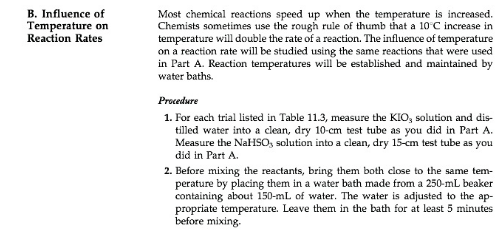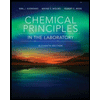B. Influence of Temperature on Reaction Rates Most chemical reactions speed up when the temperature is increased. Chemists sometimes use the rough rule of thumb that a 10 C increase in temperature will double the rate of a reaction. The influence of temperature on a reaction rate will be studied using the same reactions that were used in Part A. Reaction temperatures wil be established and maintained by water baths. Procedure 1. For each trial listed in Table 11.3, measure the KIO, solution and dis- tilled water into a clean, dry 10-cm test tube as you did in Part A Measure the NaHSOs solution into a clean, dry 15-cm test tube as you did in Part A 2. Before mixing the reactants, bring them both close to the same tem- perature by placing them in a water bath made from a 250-mL beaker containing about 150-mL of water. The water is adjusted to the ap propriate temperature. Leave them in the bath for at least 5 minutes before mixing
B. Influence of Temperature on Reaction Rates Most chemical reactions speed up when the temperature is increased. Chemists sometimes use the rough rule of thumb that a 10 C increase in temperature will double the rate of a reaction. The influence of temperature on a reaction rate will be studied using the same reactions that were used in Part A. Reaction temperatures wil be established and maintained by water baths. Procedure 1. For each trial listed in Table 11.3, measure the KIO, solution and dis- tilled water into a clean, dry 10-cm test tube as you did in Part A Measure the NaHSOs solution into a clean, dry 15-cm test tube as you did in Part A 2. Before mixing the reactants, bring them both close to the same tem- perature by placing them in a water bath made from a 250-mL beaker containing about 150-mL of water. The water is adjusted to the ap propriate temperature. Leave them in the bath for at least 5 minutes before mixing
Chemical Principles in the Laboratory
11th Edition
ISBN:9781305264434
Author:Emil Slowinski, Wayne C. Wolsey, Robert Rossi
Publisher:Emil Slowinski, Wayne C. Wolsey, Robert Rossi
Chapter20: Rates Of Chemical Reactions, I. The Iodination Of Acetone
Section: Chapter Questions
Problem 3ASA
Related questions
Question
8. What are water baths used for in Part B?

Transcribed Image Text:B. Influence of
Temperature on
Reaction Rates
Most chemical reactions speed up when the temperature is increased.
Chemists sometimes use the rough rule of thumb that a 10 C increase in
temperature will double the rate of a reaction. The influence of temperature
on a reaction rate will be studied using the same reactions that were used
in Part A. Reaction temperatures wil be established and maintained by
water baths.
Procedure
1. For each trial listed in Table 11.3, measure the KIO, solution and dis-
tilled water into a clean, dry 10-cm test tube as you did in Part A
Measure the NaHSOs solution into a clean, dry 15-cm test tube as you
did in Part A
2. Before mixing the reactants, bring them both close to the same tem-
perature by placing them in a water bath made from a 250-mL beaker
containing about 150-mL of water. The water is adjusted to the ap
propriate temperature. Leave them in the bath for at least 5 minutes
before mixing
Expert Solution
This question has been solved!
Explore an expertly crafted, step-by-step solution for a thorough understanding of key concepts.
This is a popular solution!
Trending now
This is a popular solution!
Step by step
Solved in 3 steps

Knowledge Booster
Learn more about
Need a deep-dive on the concept behind this application? Look no further. Learn more about this topic, chemistry and related others by exploring similar questions and additional content below.Recommended textbooks for you

Chemical Principles in the Laboratory
Chemistry
ISBN:
9781305264434
Author:
Emil Slowinski, Wayne C. Wolsey, Robert Rossi
Publisher:
Brooks Cole


Chemistry: An Atoms First Approach
Chemistry
ISBN:
9781305079243
Author:
Steven S. Zumdahl, Susan A. Zumdahl
Publisher:
Cengage Learning

Chemical Principles in the Laboratory
Chemistry
ISBN:
9781305264434
Author:
Emil Slowinski, Wayne C. Wolsey, Robert Rossi
Publisher:
Brooks Cole


Chemistry: An Atoms First Approach
Chemistry
ISBN:
9781305079243
Author:
Steven S. Zumdahl, Susan A. Zumdahl
Publisher:
Cengage Learning

Chemistry
Chemistry
ISBN:
9781305957404
Author:
Steven S. Zumdahl, Susan A. Zumdahl, Donald J. DeCoste
Publisher:
Cengage Learning

Introduction to General, Organic and Biochemistry
Chemistry
ISBN:
9781285869759
Author:
Frederick A. Bettelheim, William H. Brown, Mary K. Campbell, Shawn O. Farrell, Omar Torres
Publisher:
Cengage Learning

Chemistry by OpenStax (2015-05-04)
Chemistry
ISBN:
9781938168390
Author:
Klaus Theopold, Richard H Langley, Paul Flowers, William R. Robinson, Mark Blaser
Publisher:
OpenStax